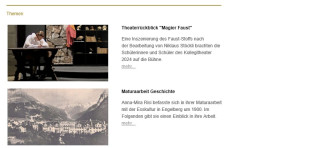Additional Information about the IB
Background
The International Baccalaureate (IB) was founded in Geneva in 1968 as a non-profit educational institution. The IB Diploma Program is an academically challenging, balanced educational program with final exams that prepare students aged 16 to 19 for successful university studies and professional careers. The program normally spans two years and is recognized by leading universities around the world. The IB program pursues the ideals and visions of the men and women who founded it, and considers it its task – as layed out in its mission statement – to help create a better world by offering high-quality education:
The International Baccalaureate program aims to develop inquiring, knowledgeable and caring young people who help to create a better and more peaceful world through intercultural understanding and respect.
To this end, the organization works with schools, governments and international organizations in developing challenging programs of international education and rigorous assessment. These programs encourage students across the world to become active, compassionate and lifelong learners who understand that other people, with all their differences, can also be right.
Recognized by Universities across the World
The IB Diploma Program is recognized as a leading international educational program. It promotes the knowledge, abilities and attitudes that empower students to perform on a high level at university. IB works together with universities in almost 150 countries in order to gain further recognition for its diploma program in the interest of the 120,000 IB graduates who begin university studies each year. More than 3,000 schools offer the DP, in 147 different countries worldwide.
Through the IB Diploma Program, students acquire a sound, balanced academic basis and an ability to refer to knowledge and understanding of different cultures and their histories. It gives them experience in critical thinking and the opportunity to apply what they learn in new contexts, ones beyond disciplinary boundaries. IB is aware that university and career success demand critical, creative thinking. The demanding curriculum of the IB Diploma Program offers a holistic approach to educating students. It enables them to develop the ability to investigate, to research and to solve problems. It provides them with the fundamental abilities of communication and cooperation.
For now 50 years, the IB program has been carrying out diligent, rigorous assessments of student performance across the world. The special IB assessment model guarantees a high degree of predictive validity and reliability, as has been proven by the many years of constant pass rates and the lack of inflation in grade marks. IB assessments are conceived so as to emphasize the training of higher-order cognitive skills. These are criterion-based, designed to measure the students’ abilities to think analytically and critically as they integrate and apply what they have learned, encouraging them to work cooperatively, and to communicate what they have learned orally and in writing.
In 2017 over 670'000 students took the IB diploma examinations. These IB students come from a broad range of ethnic backgrounds in some 140 countries, all with different experiences and perspectives as reflected in their learning experiences in the diploma program. In the context of the diploma program’s emphasis on cosmopolitanism and scholarly precision, these experiences provide students with a unique set of abilities, attitudes and perspectives for success at university, in their future professions and in our 21st-century lives.
The most recent evaluations of students with an IB diploma confirm that they perform well, attain significantly higher grades and promise better graduation rates than students without an IB diploma. The grades attained in their IB exams are also indicative of their future grades at university.
“We very much value the learning that IB students have had in their Diploma Programme. I have personally seen over the years while I have been in charge of admissions at HKU that they do not just have an understanding of their subject areas, but much more importantly, typically show levels of communication, thinking skills and all-round knowledge that equip them very well for tertiary education and beyond.” (Professor John A. Spinks, Senior Advisor to the Vice Chancellor, University of Hong Kong).
Applying for University Admission
Whoever is planning to use an IB diploma to apply for studies at a foreign university (in particular, in a British country) must understand that these universities also take note of which subjects were completed and at what level (Standard or Higher Level) when reviewing an application. There is an IB database that holds relevant information regarding many universities around the world.
The additional information given above has been derived from different documents available on the IB website (www.ibo.org).

.jpg)
.jpg)

